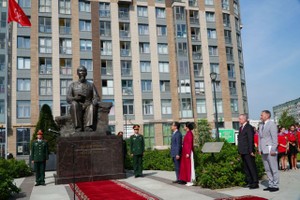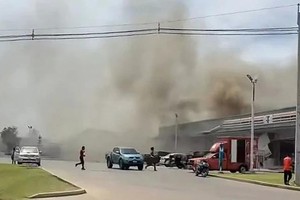France braced for another day of street rallies against pension reform Saturday as rolling strikes cut the fuel pipeline to Paris airports and shut down most of the country's oil refineries.
High-school students have increasingly joined the protests against President Nicolas Sarkozy's plan to raise the minimum retirement age from 60 to 62, with riot police firing tear gas and arresting over 200 at student rallies on Friday.
Interior Minister Brice Hortefeux has told police to "limit the use of force to what is strictly necessary" when dealing with the students ahead of Saturday's protests, the fifth in less than six weeks.
Unions want to pummel the government into backing down on its pension reform plans, staging strikes on weekdays and mass demonstrations in cities at the weekend. Over 230 rallies are planned for Saturday, the CGT union said.
The strikes have shut down 10 out of 12 of France's oil refineries, despite riot police being dispatched to keep the fuel flowing amid reports of panic buying.
The government has given oil companies permission to tap into their own emergency stocks, but has resisted calls to open the part of the French strategic fuel reserve controlled by a government committee.
Lack of supply forced the shutdown of the fuel pipeline to Paris's two main airports as well as depots outside the capital.
The main Paris air hub, Roissy Charles de Gaulle, only has enough aviation fuel to last 48 hours, La Tribune financial daily reported, and authorities have advised planes arriving there to bring enough fuel for the return flight.
"Aviation companies are worried. Air France expecially," the paper said.
Because of a Belgian railway workers' strike over deadlocked negotations, all high-speed Thalys trains between Paris and Brussels will be cancelled. Eurostar trains travelling under the Channel will be unaffected.
National railway operator SNCF said that on average two out of three high-speed TGV trains would be running in and out of Paris, although only one TGV in four will run outside the capital.
The Paris metro will be running normally, with operator RATP saying that only five percent of its workers were on strike on Friday.
Unions and the Socialist opposition have vowed to defend the right to retire at 60. They accuse Sarkozy of making workers carry the burden for the failure of the financial sector, and have proposed increasing taxes on the rich.
A nationwide day of strikes and demonstrations last Tuesday brought more than a million people on to the streets, and workers in some sectors have kept up their stoppages since then. Another mass strike is planned for next Tuesday.
Despite the ongoing strikes and protests, the government showed no sign of retreating from what is a cornerstone of Sarkozy's reform agenda as he prepares for his likely re-election battle in 2012.
Key sections of the reform have been passed by the upper house Senate and the government hopes for it to be passed in its entirety by the end of the month.
























